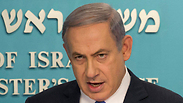
Netanyahu has no interest in any agreement
צילום: EPA
Before we storm Capitol Hill
Op-ed: As Netanyahu tries to muster a majority in US Congress against deal with Iran, It's important to hold a profound debate in Israel on whether no agreement is preferable to a signed agreement with components that are crucial for Israel's security.
The importance of the agreement reached in Vienna is not only in the detailed arrangements aimed at blocking Iran's way to a military nuclear weapon in the coming decade, but also – and that's as important – in the fact that the document was also signed by Russia and China.

This is a rare moment in the complicated relationship between the United States and Tehran's two pronounced friends and main weapon providers. Iran isn't the only country which made concessions in the tough negotiations that were held until the very last moment. Moscow and Beijing committed to it too.
Prime Minister Benjamin Netanyahu is trying to muster the required majority in the US Congress against the agreement. US President Barack Obama has already announced that he plans to veto such a decision, which would cause the agreement to collapse and erase all the concessions made by Iran.
Without an agreement, Iran will be free to do as it pleases, while the sanctions regime will anyway crumble, as many of the world's countries will rush to Tehran to sign profitable contracts. The US will then lose its influence over the situation in the 18 months left until the end of Obama's term, its leadership will be castrated and humiliated, while Israel will only remain with the independent military option. That's what British Foreign Secretary Philip Hammond referred to when he said that Netanyahu is not interested in any agreement with Iran, regardless of its content.

A Congress decision against the nuclear agreement will erase all the concessions made by Iran (Photos: Shutterstock, MCT) (צילום: shutterstock, MCT)
Hammond's impression is gaining strength in light of the major changes taking place in the Israeli strategy these days. At first, Israel maintained that the Iranian threat is a unique, existential threat which must be dealt with separately. The entire international community teamed up for this purpose, and that was the only goal of the biting sanctions against Iran. Israel had its work done by others. After all, it wasn't Israeli sanctions which forced Iran to report to the negotiations. Israel wanted others to do what was required, and they did.
The message sheet in the government spokespeople's hands overturns the previous Israeli strategy by cancelling the nuclear issue's uniqueness. The attempt to change the rules of the game and include additional demands from Iran in the agreement, like recognizing Israel and halting the support for terror, shows that Netanyahu has no interest in any agreement. Why if the nuclear issue is of existential-cardinal importance, what is the point in annulling an agreement which keeps Iran away from the bomb in order to try and insert clauses regarding terror, which is definitely not an existential threat to Israel? As far as terror is concerned, other economic and financial sanctions have been declared, and they will remain valid.
The declaration that Israel will not be committed to the agreement is unnecessary, and many even see it as ridiculous. Israel was never a side to the negotiations, and it is not committed to their results in any event.
Iran made concessions in a series of critical matters – it loathed the actual detailed discussion of its nuclear plans, and it has been hit with serious restrictions for the next 10 to 15 years. In the Middle East, a decade is eternity. Iran was also forced to agree to an invasive and unique supervision regime like no other in the world. The agreement even allows inspections at sites which supreme leader Ali Khamenei announced that he would not let inspectors into. In addition, the agreement sets a – complex but clear – process giving a forum with a clear Western majority the possibility of restoring the sanctions even without Russia and China's consent. And this is only a partial list of the concessions.
A moment before we storm Capitol Hill, led by the Israeli ambassador to Washington, it's important to hold a profound debate in Israel on whether no agreement is preferable to an agreement which includes components that are crucial for Israel's security. There will be no other agreement and no other negotiations. What is better, a signed agreement or no agreement?
Efraim Halevy is a former Mossad chief.










